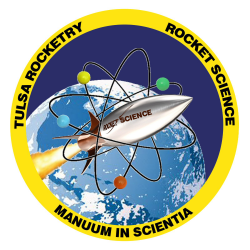Watch the Rocket Science Project Movie, Velocity right HERE
The RocketScience project was developed by the Tulsa Rocketry Club to offer launch services for small student-developed science experiments. Participating schools gain no-cost access to payload space on a large high-power payload rocket developed by Tulsa Rocketry.
Goals of the RocketScience project include:
- Develop and launch a payload rocket carrying student experiments to an altitude of approximately 1 mile and return the payloads for post-flight analysis
- Provide the opportunity for interested students to develop airborne science experiments.
- Expose students to science and engineering challenges involved in developing airborne science payloads.
- Help students develop project management skills necessary to succeed in aerospace and/or engineering career fields.
- Provide a community service by offering rocketry expertise to high school science classes.
The payload rocket was developed by members of Tulsa Rocketry and is capable of carrying 16 payload canisters per flight. The rocket is 10 inches in diameter, stands over 9 feet tall and weighs 52 pounds in flight trim. Depending on the rocket motor configuration, the rocket is capable of achieving altitudes between 5,000 and 10,000 feet.
The student designed payloads must follow the published Payload Guidelines and fit within the provided payload canister. Some ideas are listed in the Payload Examples link in the sidebar of this page.
Student experiments carried on-board the rocket will be exposed to multiple forces during flight:
- Approximately +5 Gs at launch.
- Approximately -5 Gs at rocket motor burnout
- Zero-g for a few seconds at apogee, the peak of the rocket’s flight.
The payload may also be exposed to:
- Multiple forms of vibration
- Roll rates of up to 1 cycle per second.
- Ambient temperature drop of 3 to 5 degrees per 1000 feet of altitude
Students must take these factors into consideration when designing a payload experiment.
Tulsa Rocketry has made RocketScience an annual event. Teachers interested in particpating or in learning more can contact us here.

